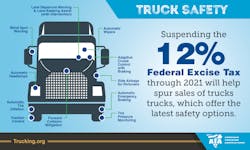Bipartisan legislation to repeal the 12% federal excise tax (FET) on the sale of heavy-duty trucks and trailers is getting “strong support” from the American Trucking Associations and Modernize the Truck Fleet, a coalition of trucking industry stakeholders.
The bill, S. 2435, comes from Sen. Todd Young (R-Indiana) and Sen. Ben Cardin (D-Maryland), both members of the tax-writing Senate Finance Committee, which has jurisdiction over transportation-related taxes.
“The federal excise tax on heavy trucks is a relic from the first World War that’s now serving to keep cleaner, safer trucks off of our nation’s roads today,” said Chris Spear, president and CEO of American Trucking Associations. “By repealing this antiquated tax, Congress can deliver a win for the environment, highway safety, manufacturing jobs, and supply-chain efficiency. We thank Senators Young and Cardin for their bipartisan leadership in advancing a common-sense solution to the benefit of American truckers and the motoring public.”
The proposed legislation is intended to modernize America’s heavy-duty truck fleet and protect the 1.3 million jobs supported by the U.S. trucking industry, according to the coalition. Repeal of the FET would allow fleets to replace older heavy-duty trucks with “newer, safer and greener” trucks and trailers. The coalition is urging Congress to include the Young/Cardin legislation in the bipartisan infrastructure legislation.
Over the past 20 years, cleaner fuel and engines used in new trucks have combined to reduce nitrogen oxide emissions by 97% and particulate matter emissions by 98%, according to the ATA. Since 2010, more fuel-efficient diesel trucks have saved 101 million barrels of crude oil and reduced CO2 emissions by 43 million tons. Life-saving, driver-assist safety technologies that weren’t widely available or effective a decade ago, such as automatic emergency braking, forward collision mitigation, and electronic stability technology, are now offered in new models.
"With most heavy-duty trucks over 10 years old, passing this bill is crucial to help America modernize its aging truck fleet,” said Steve Bassett, American Truck Dealers chairman and dealer principal of General Truck Sales in Muncie, Indiana.
A 2020 ATA survey found 60% of fleets would be either "somewhat likely" or "very likely" to buy additional trucks and trailers beyond their currently scheduled purchases if the FET were repealed.
“Funding our national infrastructure need not come at the expense of highway safety or environmental health,” Spear said. “Our industry will continue to advocate for equitable and sustainable user fees that align the goals of safer roads, cleaner air, and a growing economy."
The FET was first enacted by Congress in 1917 to help fund World War I and is the highest excise tax on a percentage basis that Congress levies on a product, often adding over $20,000 to the price of a new heavy-duty truck, MTF notes. The tax coupled with recent regulatory costs makes it more difficult for small businesses to afford a new truck.
The Truck Trailer Manufacturers Association, National Trailer Dealers Association, and National Association of Trailer Manufacturers are among the industry backers.
“Any suspension of the FET or an ultimate repeal of the tax would greatly benefit the heavy-duty truck and semi-trailer industry that provides the vehicles to deliver essential goods to our nation through the best and worst of times,” NTDA President Gwen Brown told Trailer/Body BUILDERS last year as COVID-19 shut down the economy.
And TTMA President Jeff Sims called the FET suspensions “a great way to incentivize carriers to add to their fleet a more efficient trailer.”
Mark Parker, ATD NextGen chairman from Linthicum Heights, Maryland, added: “Doing away with the FET will help small businesses replace older trucks with new trucks that have the latest safety features, which will reduce crashes and increase highway safety.”
The full text of the bill, S. 2435, to repeal the FET can be found here.
About the Author
FleetOwner Staff
Our Editorial Team
Kevin Jones, Editorial Director, Commercial Vehicle Group
Josh Fisher, Editor-in-Chief
Jade Brasher, Senior Editor
Jeremy Wolfe, Editor
Jenna Hume, Digital Editor
Eric Van Egeren, Art Director

